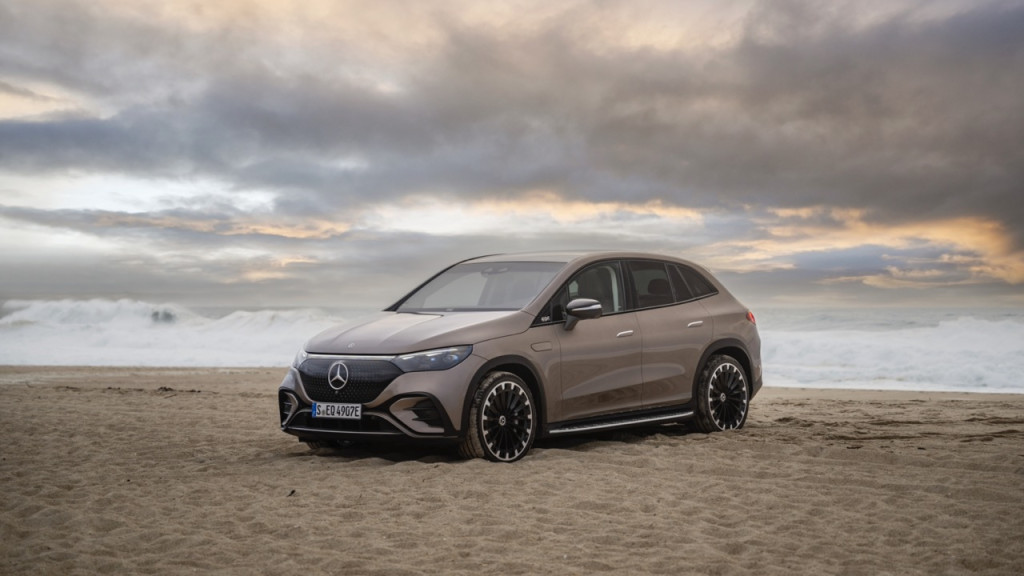Which models will be eligible for the full $7,500 of the revamped EV tax credit?
Are recent rounds of Tesla price cuts spurring stronger EV sales?
This is our look back at the Week In Reverse—right here at Green Car Reports—for the week ending April 7, 2023.
This week we once again brought you a bevy of first-drive reviews—four different new models arriving soon, plus a prototype preview drive.
2023 Hyundai Ioniq 6
In a first drive reviewing the U.S.-spec 2023 Hyundai Ioniq 6, we found this electric sedan to be more spry than sporty, optimized for efficiency, and calm and quiet in a way the Tesla Model 3 is not.
We drove the 2023 Toyota Prius Prime, which goes up to 44 all-electric plug-in miles before becoming a hybrid rated at up to 51 mpg combined. That’s better on the hybrid front than the Chevy Volt, but not up to the electric miles the pioneering GM model offered when discontinued five years ago. With the same striking shape as the new Prius hybrid, we looked at how it fits into the market today—and wondered if owners will plug them in.

2023 Mercedes-Benz EQE 500 4Matic SUV
In a first drive of the 2023 Mercedes-Benz EQE SUV, we found it offers impressive comfort, luxury, and driving range despite a smaller battery pack than the larger EQS SUV. Its charging times aren’t quite leading-edge, though.
In a review of the 2023 Toyota Corolla Cross Hybrid, we found this small crossover (or boxy wagon) to optimize value and fuel efficiency—with a sticker price starting under $30,000 and up to 42 mpg. Just don’t expect refinement or performance to be luxury-level.

Volkswagen ID.7 prototype (Euro spec)
Also check out our preview drive of the 2025 Volkswagen ID.7. This segment-buster offering up to 350 miles of range in its upcoming U.S. version looks like a sedan but is a hatchback, and it it shows why aero rules for EVs—and, perhaps, why there is hope for cars after all.
On the news front, Toyota on Friday morning revealed that it plans to push plug-in hybrid electric range beyond 120 miles. With the Prius Prime arriving at 44 miles and the RAV4 Prime at 42 miles, that would be a big change in packaging versus current PHEVs.
The 2024 Audi Q8 E-Tron starts at $75,495, the automaker confirmed last week, with at least some versions still on track for a 300-mile range. The modest price hike combined with the additional range and a sportier tune should make this version a lot more competitive versus the likes of the BMW iX and Mercedes EQE SUV.

2024 Audi SQ8 E-Tron SUV
The Fisker Ocean is good for a 440-mile range rating in Europe, the company reported last week—on that market’s more optimistic WLTP testing cycle, with U.S. EPA results not yet released. In Europe, those numbers are enough to beat the Tesla Model Y.
Kia this week confirmed that its 2024 EV9 SUV will be made in Georgia. The U.S. manufacturing of the model will start in calendar year 2024, which leaves some of the electric SUVs up until then to be delivered from South Korea. Kia earlier this week boosted its global EV targets—to 1.6 million EVs annually by 2030, up from its 1.2 million target for 2030 announced last year. That includes a family of future purpose-built EV, among them a robotaxi.

2024 Kia EV9
The Ford F-150 Lightning and Lincoln Aviator Grand Touring plug-in hybrid are the only two Ford models eligible for the full $7,500 EV tax credit with battery raw materials rules going into effect April 18. Ford is the first, or one of the first, companies to confirm the eligibility of its vehicles.
Ryder announced plans to acquire 4,000 of GM’s BrightDrop electric trucks for its rental and leasing fleet. BrightDrop is now producing the trucks at volume in Canada, though it says its 2023 production run for the larger Zevo 600 is sold out.

Ryder plans to acquire 4,000 BrightDrop electric vans through 2025
LG Innotek says that wireless battery management systems (BMS) could help downsize battery packs, save weight, and add EV range. It claims to have the first such system designed for 800-volt systems, although GM is already delivering 400-volt Ultium EVs with a wireless BMS.
Sila is claiming a 20% range boost with silicon-anode battery tech that’s on the way eventually in the boxy, brawny Mercedes EQQ SUV—with fast-charging promised, too.
Volkswagen has suggested that it plans to sunset a longtime European best-seller—the VW Golf—in favor of EVs set to arrive later in the decade.
Lyft has announced a major expansion of its EV- and hybrid-exclusive ride-hailing services. Termed Gren mode, it adds $1 to each ride with the aim of boosting the number of EVs in the fleet.

2023 Tesla Model Y – Courtesy of Tesla, Inc.
Did recent Tesla price cuts spur stronger sales? Production and delivery numbers from the EV maker released over the weekend paint a cloudier picture—and suggest that it’s continuing to build more vehicles than it’s selling. Additional price cuts of $1,000 to $5,000 made Friday appear to support the idea that Tesla is aiming to clear out some of the backlog.
Meanwhile, mass-market automotive brands not meeting EV demand will lose market share, suggests Consumer Reports, citing forecasts and recent surveys finding a 350% increase in EV demand from 2020 to 2022. CR predicts that if supplies of EVs continue to fall short, consumers will go to other EV-savvy brands or forgo the purchase of other models seen as obsolete.
_______________________________________
Follow Green Car Reports on Facebook and Twitter
Read the full article here


